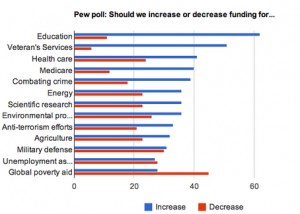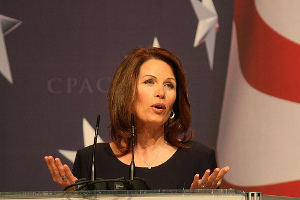As we rapidly approach another potential government shutdown due to the Congressional budget impasse, it’s a good time to examine to root of the fiscal situation in which we find ourselves. Republicans did well at the polls in 2010 by framing the problem as one of out of control government spending. Democrats have basically conceded that point, and the current debate rages over exactly how many billions of dollars should be cut and from where.
Looking for ways to contain spending is always smart, whether you’re a government, a corporation, a small business, or just a household. Left unscrutinized, expenses tend to accumulate over time, and the larger the organization, the larger the accumulation of programs and services that no longer provide a valuable service, or do so inefficiently.
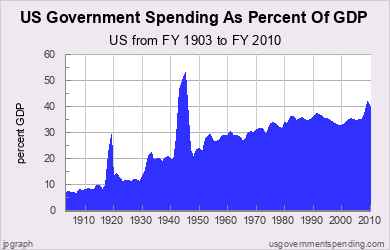 However, the current debate overlooks the larger, and frankly glaring, reality that we are not in the midst of a period of out of control spending. We are in a period of unprecedented loss of income.
However, the current debate overlooks the larger, and frankly glaring, reality that we are not in the midst of a period of out of control spending. We are in a period of unprecedented loss of income.
The chart at the right shows spending relative to GDP. Looking at these numbers relative to GDP is the only sensible approach as it takes into account the dollars relative to the size and strength of the country’s economy. What’s clear from the chart is that we are on the line that extends back for a century. The two big blips are the World Wars, but otherwise, spending growth is relatively constant. It’s also interesting to note that one of the only extended declines in spending was during the Clinton administration in the 1990s. We’ve since squandered that, which does lend credence to the claim that spending has increased dramatically in recent years. But it would still be difficult to characterize this as run away spending. Especially considering we are already seeing a downturn in spending because of the expiration of most of the stimulus programs.
Still, it’s also important to recognize the slope of this spending line is ultimately unsustainable. Eventually, this line will cross 100% and keep on going. And realistically, we need to flatten it out long before then. So yes, make some tough priority choices, strive for efficiency, and reduce waste because ultimately we do need to flatten this line out.
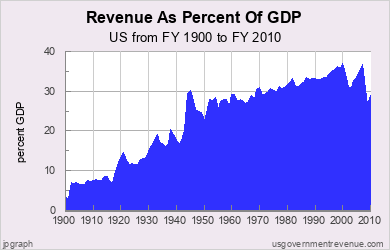 On the other side of the equation though, look at the revenue graph. There has been a precipitous drop in revenue over the last decade. As a percent of GDP, revenues have not been this low in 50 years.
On the other side of the equation though, look at the revenue graph. There has been a precipitous drop in revenue over the last decade. As a percent of GDP, revenues have not been this low in 50 years.
In part, this loss of income is attributable to the economic downturn, but it is attributable in larger part to the many tax cuts passed. So while we may argue that some of our deficits are caused by economic realities, a non-trivial chunk are caused by our choices. We are choosing to be broke, or at least choosing to be as broke as we are.
Think of this in the framework of a typical 2-income household. As a couple, you decide you need to get your spending under control as its year-on-year growth is not sustainable, but you just can’t bring yourselves to contain your spendthrift habits. So you decide to have your spouse quit their job. For a while you continue to spend at your old rate anyway because your credit cards have not maxed out. And it is only when they do that you force yourselves to cut back. Yet now you have to cut back to one-income levels, and you are also saddled with interest payments on all the debt your racked up.
Mission accomplished? In what reality? We need to get spending under control. We have a revenue problem.
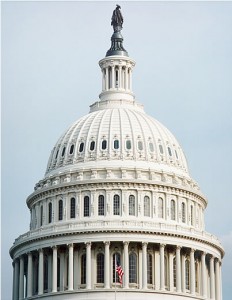 A new Washington Post/ABC News poll finds that nearly two-thirds of registered voters say they plan to “look around” to vote for someone other than their current member of Congress in 2012.
A new Washington Post/ABC News poll finds that nearly two-thirds of registered voters say they plan to “look around” to vote for someone other than their current member of Congress in 2012.

